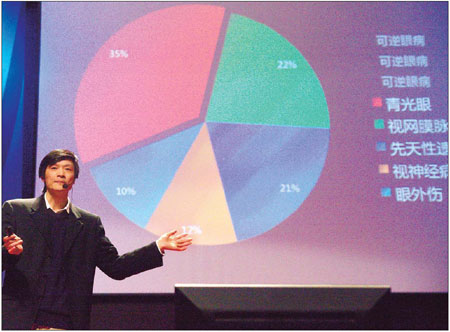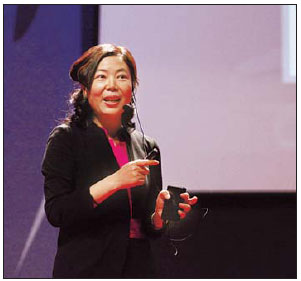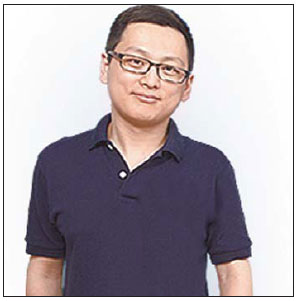Life
Breaking barriers
By Wu Chen (China Daily)
Updated: 2010-12-24 08:19
 |
Large Medium Small |
|
Peking University Eye Center glaucoma specialist Zhang Chun gives a lecture at the Time in a Nutshell forum. Photos Provided to China Daily |
|
Ma Caihong, an expert with the reproduction center at Peking University Third Hospital, delivers a speech at the forum. |
|
The forum is the brainchild of Scientific Squirrels Club's founder Ji Xiaohua. |
Recognizing that to popularize science it has to be demystified, nation's pioneering science forum goes for a bit of theater. Wu Chen of China Features reports
It was meant to be a lecture on glaucoma, but sounded like a crime thriller. When Peking University Eye Center glaucoma specialist Zhang Chun mulled the title of a lecture for the science-based Time in a Nutshell forum (TINS) recently, he quickly learned that Know About Glaucoma or The Prevention of Glaucoma would not work.
It was not until he suggested Glaucoma: Catching the Thief that he got the organizers' attention.
But even that title did not make the cut and they eventually settled on Who Steals Your Eyesight?
"The difficult part was not knowing my target audience," Zhang says. "At an academic forum, I know I'm talking to people in my profession. On other occasions, they are patients. But this time, they came from all walks of life."
For two months before his speech, the organizers contacted him every day to discuss how he could improve his speech.
"It was totally different from other forums where I only need to make PowerPoint slides and rehearse my presentation a couple of times," says Zhang, 45, who finally came up with a tailor-made PowerPoint presentation, complete with video clips.
The forum also saw two psychologists and a gynecologist giving 20-minute lectures each with pictures on the big screen.
Yu Xiaoxia, who attended the forum, says she used to think scientists were all like her teachers at school: authoritative and distant. "But here, I saw scientists who were both trendy and approachable."
That is exactly the reaction the team behind the TINS forum want to hear. They want to create true "science stars".
TINS is the brainchild of Ji Xiaohua, better known by his pen name, Ji Shisan, who says he was inspired by the many dramas he saw when he first came to Beijing in 2008.
"I thought if talks by scientists were also given a theatrical effect, it would promote scientific understanding," he says.
He says the idea follows the philosophy of TED - Technology Entertainment and Design - a global set of conferences curated by the US non-profit Sapling Foundation, which aims to disseminate "ideas worth spreading".
But it's an uphill battle in a country where many worthless ideas gain ground quickly.
Late in 2009, a traditional Chinese medicine aficionado Zhang Wuben gained fame overnight through his food therapy lectures on television and his hallmark theory that mung beans cure all. His book, Eat Out the Diseases You Have Eaten, became a best-seller on book-retailing website, joyo.com.
His medical qualifications were later exposed as false and his theories have been refuted - but only after the husband of cleaning woman Li Yuying ate a mountain of raw eggplants after Zhang recommended it on TV as a cure for high blood fat.
"So many TV stations invited him to give lectures, there was no reason for us to doubt his theories," says Li, 48.
Tian Chen, co-producer of the TINS forum, says the spreading of real science is more difficult than disseminating bogus "science".
"Fake science always appears as simple and easily-understood catchphrases, but introducing a scientific concept demands detailed explanation," Tian says.
The China Association for Science and Technology released a survey on Nov 25, showing that only 3.27 percent of Chinese have basic scientific literacy, a relatively low proportion although the figure is up from 1.6 percent in 2005 and 2.25 percent in 2007.
Ji says more people are being lured to pseudo science and believes, "Effective communication between scientists and the public is one way to overcome this".
Meanwhile, critics say some of the blame must be borne by the scientists themselves as their ability to bring their work to the notice of the public lags behind that of their foreign counterparts.
When the first TINS forum was held in May, presenters were picked for advanced achievements in their field of work. Most presenters are young and have no established reputation, but are willing to contribute to the popularization of science, Tian says.
"Then we consider their ability to communicate. And it's an advantage if they are good looking," she says.
Forum topics are closely linked to everyday life and include health, food safety, information technology and environmental protection.
Besides people from the media, NGOs, and government and scientific research institutions, the invited audience also includes people applying online.
"We give opportunities to those who seem to have less contact with science," Tian says.
After the shows, videos of the talk are uploaded to the Internet and are available for free. Videos of the first four sessions of the TINS forum have been viewed more than 20,000 times.
"We hope more people can get involved in discussions via the Web and thus enhance their understanding of science," Tian says.
Ji hopes that, "By understanding the cause and effect of some basic scientific phenomena, people will also develop the ability to ask the 'why' questions when it comes to other theories".
The founder of the Scientific Squirrels Club, Ji has big plans. In November, the club registered a formal NGO, Hi Science, which runs the club and TINS. Other non-profit projects are in the pipeline.
Tian says Hi Science will also look at rural areas in the future. "But now we have to focus on improving TINS, which is mainly aimed at educated urban youth."
Ji's ambition is to make science a part of people's everyday lives.
"Three years ago, we seldom saw popular science in the media. Things are changing now," he says. "This is a big step forward, and I believe I will realize my goal one day."


